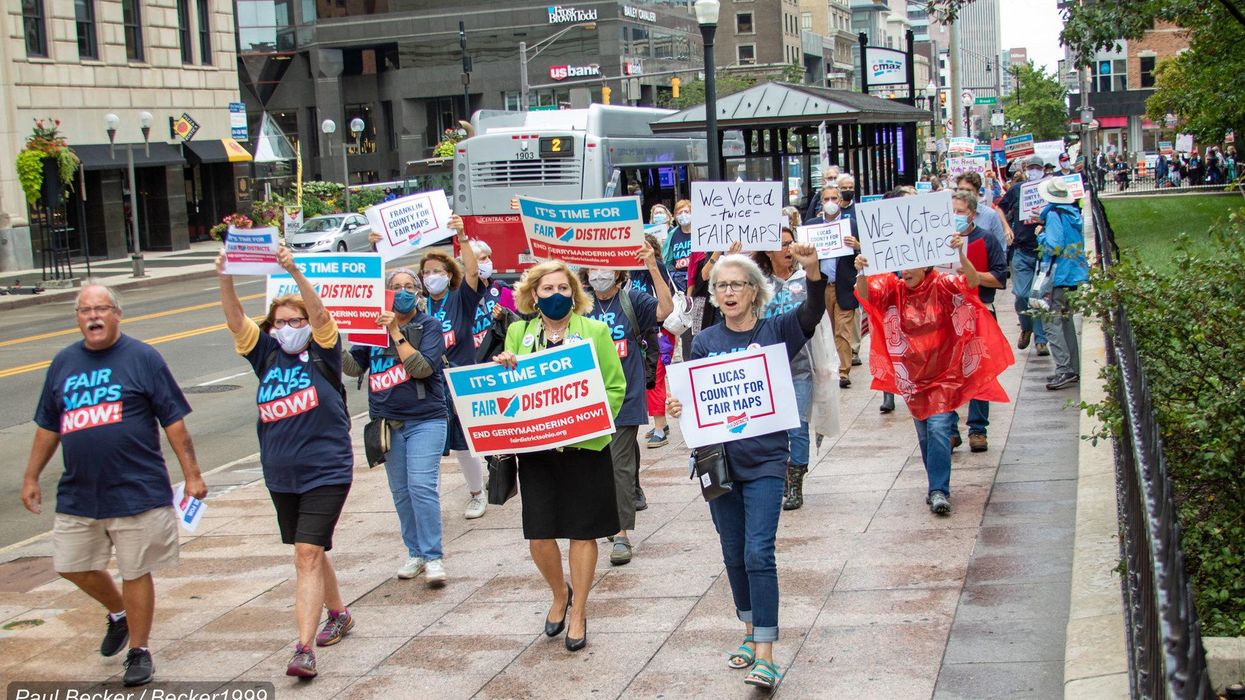Anti-gerrymandering forces hope ongoing litigation will limit the impact of partisan and racial bias in state and congressional redistricting this cycle.
Common Cause, a national organization focused on democracy reform, is partnering with groups in multiple states to fight new district maps that they identify as racial or partisan gerrymanders, often arguing that the two go hand-in-hand.
While more than 60 lawsuits have been filed in at least 22 states by various groups, Common Cause is particularly focused on litigation in North Carolina, Ohio and Pennsylvania as well as unusual redistricting activity in Florida.
Communities of color have been able to make their voices heard more this cycle than in the past, said Suzanne Almeida, redistricting and representation counsel for Common Cause.
“This year it’s been more coordinated, more concentrated and more focused, and because of that we’re seeing some wins we might not otherwise have seen,” she said. “Unfortunately, we’re also seeing a national trend where the redistricting cycle is weakening these voices.”
Almeida argued that legislators are making partisan decisions at the expense of community voices: “We are seeing state after state intentionally draw maps that silence communities of color at the ballot box.”
One of the places Common Cause and its legal allies have had success is North Carolina, which has a history of gerrymandering battles.
“We have been the epicenter of bad maps, arguably,” said Bob Phillips, executive director of Common Cause North Carolina. But he believes it’s possible the state has turned a corner.
The North Carolina Supreme Court ruled that the legislative and congressional maps approved by the General Assembly violate the state Constitution’s prohibition on partisan gerrymandering. Even though the state has been narrowly divided in recent national elections, the proposed maps would deliver heavy Republican majorities in the General Assembly and the congressional delegation, likely eliminating districts where candidates of color would be expected to win.
Any new maps must include statistics to justify their nonpartisanship.
“In North Carolina, we filed litigation to make clear it is never admissible to build political power on the backs of communities of color—and the State Supreme Court agreed,” said Phillips. “The ruling is one more nail in the coffin of gerrymandering in North Carolina and a powerful reminder of what’s possible when you combine litigation with grassroots advocacy.”
The courts in Ohio have similarly sided with anti-gerrymandering forces.
On Monday, state Supreme Court rejected proposed legislative maps for the second time in 2022 for violating the Ohio Constitution, which voters amended to limit partisan gerrymandering. The court also rejected the congressional map in January.
The people in charge of redistricting ignored the new requirements around transparency, public participation, bipartisanship and representational fairness, according to Common Cause Ohio Associate Director Mia Lewis, who claimed “these rigged maps are made on the backs of people of color.”
“This showed an epic disrespect for the voters of Ohio and the Ohio Constitution,” she said. “It was really galling to see this process go so wrong.”
And in Pennsylvania, where the state is led by a Republican General Assembly and a Democratic governor, the local chapter has engaged in the redistricting process by submitting a map of its own.
“Common Cause Pennsylvania is participating in this case as an amicus to ensure that voters of color that have historically been left out or worse by the redistricting process can have their voices heard,” said Khalif Ali, executive director of the chapter. “We are continuing to seek a better way of drawing maps that put people, not politicians, in the drawing seat.”
The battle in Florida is different. Rather than suing over approved maps, Common Cause Florida and other groups are trying to prevent Gov. Ron DeSantis, a Republican, from getting involved in the redistricting process prior to the Legislature sending him its proposal.
Opponents believe DeSantis’ proposed congressional map would reduce the influence of Black voters while increasing the number of seats held by Republicans.
“It is not normal for any court, especially a supreme court, to give an advisory opinion to someone who doesn’t even have the authority to draw maps,” said Allison Riggs, co-executive director and chief counsel of the Southern Coalition for Social Justice.
In all of these cases, the anti-gerrymandering advocates believe partisan gerrymandering and racial gerrymandering are being practiced simultaneously.
“Racial discrimination and partisan gerrymandering are tools that work together,” said Riggs.



















 Senate Committee on Commerce, Science, and Transportation ranking member Sen. Maria Cantwell (D-WA) (R) questions witnesses during a hearing in the Russell Senate Office Building on Capitol Hill on February 10, 2026 in Washington, DC. The hearing explored the proposed $3.5 billion acquisition of Tegna Inc. by Nexstar Media Group, which would create the largest regional TV station operator in the United States. (Photo by Chip Somodevilla/Getty Images)
Senate Committee on Commerce, Science, and Transportation ranking member Sen. Maria Cantwell (D-WA) (R) questions witnesses during a hearing in the Russell Senate Office Building on Capitol Hill on February 10, 2026 in Washington, DC. The hearing explored the proposed $3.5 billion acquisition of Tegna Inc. by Nexstar Media Group, which would create the largest regional TV station operator in the United States. (Photo by Chip Somodevilla/Getty Images)
